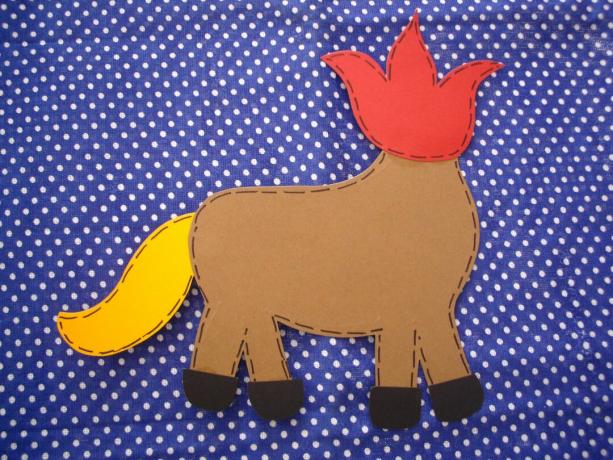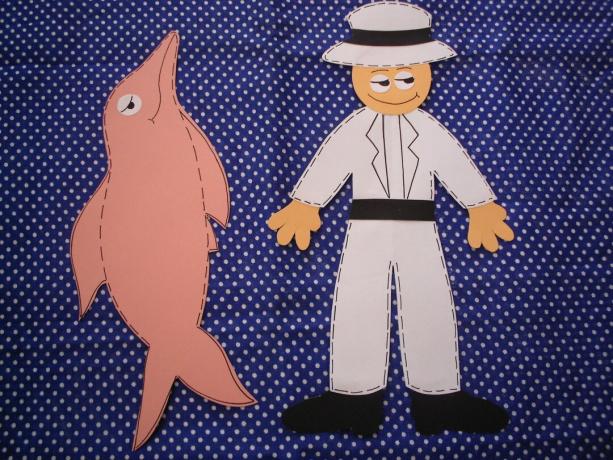In this post we have selected excellent suggestions and ideas ready for your Early childhood education folklore lesson plan.
O Folklore DayBrazilian is celebrated annually in August 22.
Folklore is the culture of a people, the set of cultural traditions knowledge, beliefs, customs, dances, songs and legends of individuals in a particular nation or locality.
The term folklore originated through a neologism created by the British William John Thoms (1803-1885), who put together the English words folk (which means "people") and lore (which means “knowledge”).
Thus, folklore takes on the literal meaning of "knowledge of the people" or “what people do”.
Folklore is the way of acting, thinking and feeling of a people or group with the qualities or attributes that are inherent to it, regardless of the place where time and culture are located. It's not just the past, the tradition; he is alive and is connected to our lives in a very strong way. That's why it's so important to get to know him.
Folklore knowledge is what we informally learn in the world, through social interaction – orally or by imitation. It is universal, although local or regional adaptations take place as a consequence of collective additions.
See too: Activities about folklore.
Index

Check out others Ideas and Suggestions for working theFolklore Day.

Folklore Early Childhood Lesson Plan – The Brazilian Folklore
The need to keep the culture of the people alive in order to provide and disseminate the knowledge and information so necessary in the construction of our history led me to develop this project, which helps to understand "Today", based on previous experiences, rescuing "yesterday", without it being erased with time and new generations do not have access to their origin.
Main goal: Have knowledge of Brazilian folklore, identifying its characteristics and values.
what do you know
what they don't know
would like to know

Kindergarten folklore lesson plan and early grades
a) Conceptual: Build concepts with children about what folklore is through their experiences.
b) Procedural: Allow children to appropriate knowledge of human culture such as new ways of playing, singing, dancing, talking, etc.
c) Attitudinal: Encourage appreciation and respect for the different ways of living of different groups and people.
a) Personal and Social Training: socialization, respect, valuing the other, autonomy, initiative.
b) Oral and Written Language: speech, dialogue, argumentation, parlenda, travalingua, riddles, songs, writing, recipe, reading, legends, informative texts.
c) Nature and Society: history of toys and games, different ways of singing, playing and telling stories.
d) Movement: dancing, playing.
e) Music: songs.
f) Art: dramatization of legends.
g) Mathematics: construction of toys (shapes, colors, measurements, recipes).
We also suggest these other ideas for working the folklore week

Folklore Lesson Plan Early Childhood Education at School
The history of humanity is permeated by symbolism resulting from the beliefs and traditions of each of the peoples who, through contact and the existing cultural variety, it delineates its historicity and marks its identity traits in the world.
The historical experience of a people builds its lifestyle, its traditions, customs, beliefs, and such interconnected elements form its culture.
Folklore is the strongest expression of the way of life of each social group. Thus, taking into account the importance of cultural manifestations in the life of the population and the need for its preservation, we developed this project, in an attempt to perpetuate this important element of identity cultural. Therefore, popular knowledge is one of the starting points for pedagogical practice, thus seeking to expand knowledge, understanding and analysis of Brazilian folklore through dialogue with students, questions about their own experiences about the various legends, games, toys, parlendas, songs, tongue twisters, etc., leading them to research the theme in question.
Activities will be proposed to rescue popular culture through: legends, parlendas, rhymes, games, tongue twisters, and riddles.
The activities will be developed individually and collectively with teacher and student interaction.
Students will research manifestations of Brazilian popular culture, create drawings that can illustrate the texts (parlendas, tongue twisters, short stories) worked on in the classroom referring to the theme.
For this, we will use:
Conversation and registration (probing prior knowledge);
As this theme is rich in content and activities to be developed, enabling a good performance in the work of the content mentioned above, it is concluded that this is a relevant topic for the development of skills and competences previously cited.
Subscribe to our email list and receive interesting information and updates in your email inbox
Thanks for signing up.